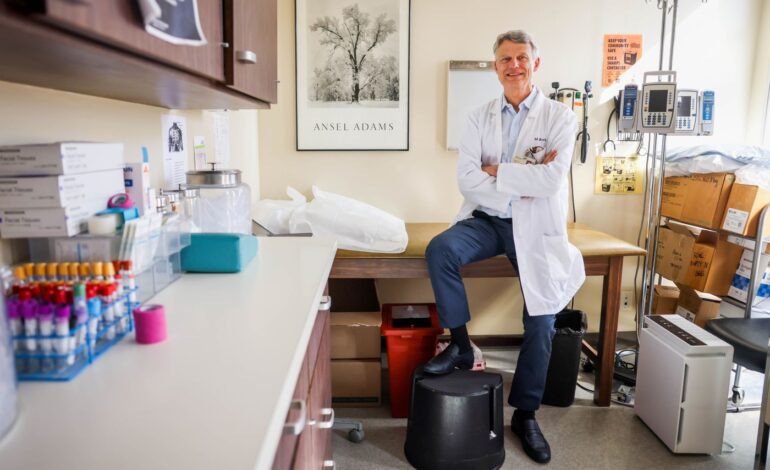Bay Area Doctor Leads Global Effort for Hepatitis B Cure

Dr. Maurizio Bonacini, a liver specialist based in San Francisco, is at the forefront of a global initiative to find a cure for chronic hepatitis B, a disease that affects more than 2 million people in the United States alone. Despite being preventable through vaccination and treatable with existing medications, hepatitis B continues to spread, posing a significant health threat. The World Health Organization indicates that approximately one in three individuals worldwide has been infected with acute hepatitis B, with a staggering 90 percent risk of developing chronic infection in infants.
The consequences of untreated hepatitis B are severe. The virus leads to liver cancer in about 25 percent of cases, resulting in a mortality rate that claims one in four affected individuals. While effective vaccines and antiviral treatments exist, the absence of a definitive cure remains a critical gap in public health efforts.
In pursuit of a breakthrough, Dr. Bonacini has joined B-United, a clinical trial that involves 300 patients across 80 sites in 18 countries. Sponsored by GlaxoSmithKline, a biopharmaceutical company based in the UK, the trial aims to explore innovative treatment options. Dr. Bonacini leads one of the two investigation sites in California, with the other located in San Jose under the direction of Dr. Huy A. Nguyen.
At his San Francisco site, Dr. Bonacini was the first to administer a potential cure for chronic hepatitis B. Current treatment regimens require patients to take antiviral pills for life to prevent the virus from reactivating. These medications effectively halt the replication of hepatitis B DNA, significantly reducing the risk of liver cancer and other complications. However, they are not without side effects, including respiratory infections, fatigue, and gastrointestinal discomfort.
Dr. Bonacini aspires for a “gold” standard in treatment—a sterilizing cure that eliminates all traces of the virus. Until such a solution is found, he is focused on achieving a “functional cure,” which would allow patients to stop taking antiviral medications while reducing cancer risk by up to 80 percent.
As part of the B-United trial, Dr. Bonacini monitors ten participants from the Bay Area while overseeing an additional 200 patients who do not qualify for the study. Trial participants receive monthly injections of an investigational drug designed to inhibit the production of the virus’s surface antigen. After 24 weeks, they begin receiving another research drug weekly for an additional 24 weeks. If the surface antigens remain absent after 24 weeks, treatment ceases, although patients will continue to be monitored closely.
The U.S. Food and Drug Administration (FDA) may consider the injections for market approval as early as late 2027. In the meantime, Dr. Bonacini advocates for enhanced prevention and early diagnosis of hepatitis B. He has recently engaged over 60 primary care physicians in California, urging them to incorporate state-mandated screening for hepatitis B into electronic health records. However, he faced resistance due to the perceived burden on already overworked practitioners.
Dr. Bonacini expressed concern that many doctors are reluctant to require additional testing for their patients, despite the theoretical coverage by insurance in California. He pointed out a significant oversight in U.S. immigration health requirements, which mandates vaccination proof for immigrants but does not require hepatitis B screenings.
This regulatory gap can have dire consequences. One of Dr. Bonacini’s study patients, a San Francisco resident in his 40s, discovered he had contracted hepatitis B after receiving a vaccine as a child. He immigrated to the U.S. from Southeast Asia at the age of nine and learned of his infection during a routine check-up in his 30s. Since enrolling in the chronic hepatitis B research trial, he has achieved undetectable levels of the virus and is currently considered non-contagious.
Despite his progress, the patient—who wishes to remain anonymous due to the stigma surrounding hepatitis B—expressed frustration at the ongoing health challenges and financial burdens associated with managing the disease. He incurs significant costs for regular blood tests and imaging, which can reach up to $700 annually, not including medication expenses. He has committed to participating in any clinical trial that may lead to a cure.
Dr. Bonacini believes that improved prevention strategies could drastically reduce the incidence of hepatitis B in future generations. Nonetheless, he emphasizes the necessity for a cure, asserting that universal vaccination is impractical. His efforts extend beyond local initiatives; he collaborates with virologists and clinicians globally, from Tanzania to Hong Kong, where up to 7 percent of the population is affected by the disease.
With ongoing studies suggesting that a cure may be within reach, Dr. Bonacini remains optimistic. “We just have to find the right drugs,” he stated, summing up the hopeful journey toward eradicating hepatitis B.






